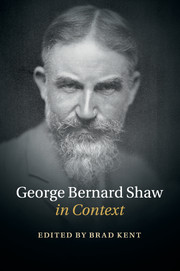Book contents
- Frontmatter
- Dedication
- Contents
- List of illustrations
- Notes on contributors
- Preface
- Acknowledgements
- A Chronology of Shaw's Works
- List of abbreviations
- PART I PEOPLE AND PLACES
- PART II THEATRE
- PART III WRITING AND THE ARTS
- PART IV POLITICS
- PART V CULTURE AND SOCIETY
- 31 Celebrity
- 32 Education
- 33 Evolutionary theory
- 34 Health and vegetarianism
- 35 Language
- 36 Nature
- 37 Philosophy
- PART VI RECEPTION AND AFTERLIFE
- Further reading
- Index
- References
36 - Nature
from PART V - CULTURE AND SOCIETY
Published online by Cambridge University Press: 05 October 2015
- Frontmatter
- Dedication
- Contents
- List of illustrations
- Notes on contributors
- Preface
- Acknowledgements
- A Chronology of Shaw's Works
- List of abbreviations
- PART I PEOPLE AND PLACES
- PART II THEATRE
- PART III WRITING AND THE ARTS
- PART IV POLITICS
- PART V CULTURE AND SOCIETY
- 31 Celebrity
- 32 Education
- 33 Evolutionary theory
- 34 Health and vegetarianism
- 35 Language
- 36 Nature
- 37 Philosophy
- PART VI RECEPTION AND AFTERLIFE
- Further reading
- Index
- References
Summary
‘From nature, too, one learns everywhere’ (SSS 47), Shaw wrote. Of his early days in London, he noted that ‘I had a magnificent library in Bloomsbury, a priceless picture-gallery in Trafalgar Square, and another at Hampton Court … I had from Nature the brains to use them’ (SSS 51). In the same autobiographical memoir, Sixteen Self Sketches, Shaw states: ‘When it turned out later on that I was a born Shakespearean genius I flattered myself that Nature, alias Providence, alias The Life Force, had given me in my boyhood an excessive regard for self-preservation’ (SSS 109). By connecting nature with the Life Force, Shaw communicates a sense of the value of nature in his worldview, the Life Force being his fundamental belief in a power that governs the material universe.
Shaw spent a great portion of his boyhood surrounded by nature while ruminating on spiritual matters and serious subjects. Hesketh Pearson recounts how Shaw was wandering through the furze bushes on Dalkey Hill at dusk when he suddenly asked himself why he repeated his prayers every night and decided to stop doing so; he soon found that he did not miss them at all. The point is that Shaw often thought, while a young lad, ‘about profound matters while he was wandering in nature’, and that this experience initiated the development of his moral passion by providing him with beauty, solitude, and the opportunity for introspection without the interference from established religions and the intrusion of society.
The influence of Shaw's exposure to nature while living at Torca Cottage on Dalkey Hill from 1866 to 1874 was profound. ‘My university had three colleges: Lee's Musical Society, the National Gallery, and Dalkey Hill’, Shaw asserted. On more than one occasion, he maintained that ‘the happiest moment’ of his life was when his mother told him that they were going to move from their inner Dublin street to Dalkey (CPP VII: 309; SSS 72). Surrounded by mountains and trees with a sweep of the whole of Dublin Bay from Kingstown, now known as Dùn Laoghaire, to Howth Head, the sight from Dalkey caused Shaw to remark that ‘I have never seen more beautiful skies, even in Venice; and I always look at the sky’.
- Type
- Chapter
- Information
- George Bernard Shaw in Context , pp. 297 - 305Publisher: Cambridge University PressPrint publication year: 2015



